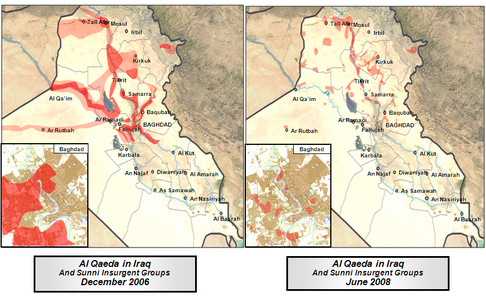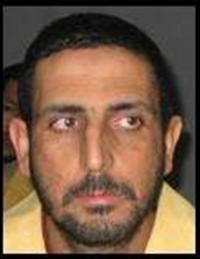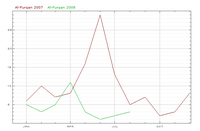Al Qaeda’s senior leadership has lost confidence in its commander in Iraq and views the situation in the country as dire, according to a series of letters intercepted by Multinational Forces Iraq earlier this year.
The letters, which have been sent exclusively to The Long War Journal by Multinational Forces Iraq, are a series of communications between Ayman al Zawahiri, al Qaeda’s second in command, Abu Ayyub al Masri, al Qaeda in Iraq’s leader, and Abu Omar al Baghdadi, the leader of al Qaeda’s Islamic State of Iraq. These letters were intercepted by Coalition forces in Baghdad on April 24, 2008. One of the letters written by Zawahiri is dated March 6, 2008.
Coalition forces found the letters on the corpse of a senior al Qaeda in Iraq leader called Abu Nizar, whose real name is Ali Hamid Ardeny al Essawi. He was killed when he was stopped at a Baghdad checkpoint and pulled a gun. He later was identified by al Qaeda operatives in custody.
At the time of his death, Nizar served as al Qaeda in Iraq’s information minister. His responsibilities included running al Qaeda in Iraq’s propaganda network as well as the primary link to the regional terror group and al Qaeda’s senior leadership.
These communications with al Qaeda in Iraq leaders matched the US military’s view that the terror group suffered a major setback in Iraq.
“The letters confirmed our assessment that Al Qaeda has suffered significant damage and serious reverses in Iraq, including widespread rejection of [al Qaeda in Iraq’s] indiscriminate violence, extremist ideology, and oppressive practices,” General David Petraeus, the Commander of Multinational Forces Iraq told The Long War Journal. “Even Zawahiri recognized that [al Qaeda in Iraq] has lost credibility in Iraq.”
Letters show al Qaeda in Iraq’s leadership is in disarray
The series of letters highlights the divisions within al Qaeda in Iraq and highlights al Qaeda’s senior leadership’s questions about the leadership in Iraq. Al Masri is portrayed as an ineffective leader who is refusing to respond to questions by al Qaeda’s senior leadership based in Pakistan. Leaders also criticize al Qaeda in Iraq’s propaganda campaign, stating the group has intentionally deceived followers by releasing old footage and inflating enemy casualties.
A rash and incompetent leader
Much of the criticism of al Masri comes from a senior al Qaeda in Iraq leader known as Abu Suleiman al Otaibi, a Saudi national who served as a senior leader in al Qaeda’s Islamic State of Iraq. Otaibi “migrated” to Afghanistan at the end of 2007, where he then reported to al Qaeda’s leadership on al Masri’s leadership flaws. Otaibi was killed by US forces during a strike in Paktia province in the spring of 2008.
Otaibi’s concerns about al Masri are expressed in Zawahiri’s letter to Baghdadi, where al Masri is portrayed as an ineffective, rash leader who has cut himself off from al Qaeda in Iraq’s field commanders. Al Masri, according to Otaibi, only communicates through a tight circle of “very leading personalities” in order to avoid being targeted by US forces. He bristles at criticism of his actions or those of his appointed commanders and refuses to accept bad news.
Otaibi’s harshest criticism of al Masri is leveled at the latter’s decision to send a force of al Qaeda fighters into Ramadi in late June 2007. Al Masri is said to have ordered the al Qaeda fighters to attack Ramadi “in a moment of anger against the brothers … despite of the great danger.” At that time, the Awakening and Iraqi and US security forces consolidated control over much of Anbar province, and al Qaeda’s network was seriously degraded in the region.
The Iraqi police in the Ramadi region received word of al Qaeda in Iraq’s plan, and US forces ambushed the group as it gathered in an island on the Euphrates River. The engagement, called the Battle of Donkey Island, resulted in at least 23 al Qaeda fighters killed and dozens captured. Otaibi said only a handful of al Qaeda fighters escaped from the battle.
Failure to communicate
In one letter from Zawahiri to al Masri, Zawahiri implores al Masri to defend himself from criticism from other al Qaeda in Iraq’s leadership. Zawahiri then asks for a status update and chides al Masri for failing to respond to prior inquiries.
“We also want to repeat to you our request to write to us full detailed reports about your current conditions,” Zawahiri stated. “Also, the brothers request to know about your experiences and I have asked you about this many times.”
Al Qaeda in Iraq’s propaganda failures
Otaibi savages al Qaeda in Iraq’s propaganda efforts. The group is guilty of recycling old footage from the archives of al Tawhid wal Jihad, the predecessor of al Qaeda in Iraq, and rerunning the footage as new attacks, Otaibi told Zawahiri.
“[The videos] are all old from the archives and were presented as if they were new operations, and this is fraudulent and concealment of the truth,” Otaibi was paraphrased as saying in one of the letters. He also states that the group stole video footage from other Sunni insurgent groups and rebranded the content as their own.
Al Qaeda’s handling of its propaganda has been a sore spot among jihadi and insurgent groups for years, said Nick Grace, who tracks al Qaeda’s propaganda efforts.
“It’s openly known on the al Qaeda forums that the Islamic State of Iraq and al Furqan Media Center churn out archival footage, including years-old attacks by Zarqawi’s group al Tawhid wal Jihad,” Grace said. “They have also been caught posting videos of attacks conducted by other groups in Iraq with their media logo. Sunni insurgents complained publicly about al Furqan’s methods in September 2007.”
Al Qaeda in Iraq’s propaganda output has been significantly degraded, Grace said. Al Furqan released 111 videos in 2007, according to Grace. Only 34 videos have been release since January 2008.
“On the brink of extinction”
Information from recently captured al Qaeda operatives supports the letters from senior al Qaeda leaders that portray the jihad in Iraq being in disarray, according to a Multinational Forces Iraq document obtained by The Long War Journal.
An operative captured on Aug. 21 said the group has “lost the overall fight” and suffers from “extreme financial difficulties.” Al Qaeda in Iraq and the Islamic State of Iraq do “not presently have any long time plan and are only focused on short time fighting,” the operative told US forces.
Another operative, also captured on Aug. 21, said “foreign fighters in Iraq are on the brink of extinction and the group’s “biggest concern right now is where to sleep at night without being arrested.”
Recent estimates of foreign al Qaeda fighters entering Iraq backs up this assertion. From February to June 2007, an estimated 80 to 110 foreign fighters were entering Iraq, according to Multinational Forces Iraq. From January to August 2008, the estimate is 12 to 15 foreign fighters entering the country. Senior al Qaeda leaders, including al Masri, were reported to have fled Iraq to Pakistan’s tribal areas earlier this summer.
Al Qaeda in Iraq is also suffering from serious logistical and recruiting problems. Communications have been disrupted and al Qaeda cannot pay its fighters, other captured al Qaeda leaders said. In Baghdad, al Qaeda lost 75 percent of its strength. In Mosul, al Qaeda operations are assessed as being in a “state of irreparable deterioration” and survival is the measure of success.
Throughout Iraq, recruiting is difficult if not impossible. “The main problem is that al Qaeda in Iraq has lost support of the people in Iraq,” one captured operative said.
Petraeus advises caution
While the news of al Qaeda’s setbacks in Iraq is encouraging, General Petraeus advises caution in moving forward and is hesitant to declare victory prematurely.
“No one here is doing victory dances in the end zone, as AQI [al Qaeda in Iraq] remains lethal and dangerous,” he told The Long War Journal. “In fact, though there has been substantial progress, AQI has demonstrated resilience, adaptability, and a continuing capability to carry out barbaric attacks, albeit in much smaller numbers. So we and our Iraqi partners clearly have much work still to do — and that’s what we’re endeavoring to do.”
Note: Tony Badran, a research fellow at the Foundation for Defense of Democracy’s Center for Terrorism Research, will publish a translation and summary of the letters at FDD’s new website later this evening.











13 Comments
So AQ is largely shattered, and JAM is now a “social organization” after getting routed between March and June…what’s next? Some of these pacified areas can probably start transitioning to IP and local police soon.
This news could not have come out at a better time.
God Bless America & long live a FREE Iraq!
AQ’s leaders need a course in positive reinforcement techniques. Enough of this doom and gloom. Pump up the AQ troops and get them moving. Then we can kill them even faster. Since getting killed is one of their main aims, I don’t see the problem here. I mean, we actually agree with them on this goal. We have found common ground!
Great story Bill. Unbelievable scoop.
Wait, isn’t al-Baghdadi supposed to be fictional? Why are they sending letters to him?
Amen Steve-o, Amen!
It’s possible that Zawahiri is so out of touch that he doesnt realize Baghdadi is fictional.
Excellent news though we need to keep beating on them while the IA and INP continue to mature, especially over the next few months as the paymasters continue to change for the SOI.
Excellent news. Thanks for reporting this.
Iraqis are tired of violence – we don’t want anymore murderers in the country. Also, Moqtada is losing as well – people in the south all know his JAM are thugs. All we now need to do is get rid of the pro-Iranian Badr organisation.
Long Live the USA and Iraq.
[“Posted by Ali at September 12, 2008 8:42 AM ET:
Excellent news. Thanks for reporting this.
Iraqis are tired of violence – we don’t want anymore murderers in the country. Also, Moqtada is losing as well – people in the south all know his JAM are thugs. All we now need to do is get rid of the pro-Iranian Badr organisation.
Long Live the USA and Iraq.”]
Ali.
Kudos to you. It is wonderful you participate here. Keep safe and strong. We appreciate your perspective.
mjr007
OK, after MNF-I exposed Baghdadi as being played by an actor, AQ backfiled the position. I will write something on this, I should have awhile back…
Excellent article. Thanks for the background. When the political stage becomes more sane, Mr. Roggio and his contributors will win Pulitzers for their reporting. Although the news is encouraging, I am also sobered by Gen. Petraeus’ comments. He is a man who knows how NOT to overstate something. I would take just about anything he says to the bank!
The Thunder Run has linked to this post in the blog post From the Front: 09/12/2008 News and Personal dispatches from the front and the home front.